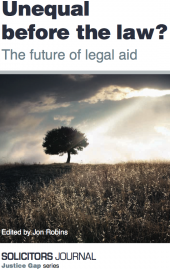Cutting legal aid is ‘a false economy’, according to the report of a panel of three non lawyer experts . Unequal before the law? the future of legal aid sets out the findings of a Commission of Inquiry into Legal Aid comprising Evan Harris, former Liberal Democrat MP; Diana Holland, assistant general secretary of the trade union Unite; and the Reverend Professor Nicholas Sagovsky, until recently the canon of Westminster Abbey. These three non-partisan and independent-minded experts, each with a long track record of promoting social justice, were asked to examining the cases for and against legal aid. In a launch at the House of Commons, they revealed their findings and argued that cutting legal aid would not bring the savings to Government spending that justice secretary Ken Clarke hoped for.
The Commission was organized by the Haldane Society of Socialist Lawyers and the Young Legal Aid Lawyers. The report was published by Jures and Solicitors Journal and edited by thejusticegap.com editor Jon Robins. You can download it from the Justice Gap series page. It’s free.
The purpose of the Commission was to consider objectively, at a time of cuts to public spending including proposals to remove £350 million from the £2.1 billion legal aid budget, the value of the safety net which the legal aid system provides for the ordinary people, sometimes poor and usually vulnerable, who rely upon it. They were asked to consider the cases both for and against legal aid.
‘Without legal aid I would not have been able to get the help I needed. I would have either been forced back into an abusive relationship or had to move to a refuge with my two children.’
SH, written evidence to the Commission of Inquiry into legal aid.
In February this year the three panel members of the Commission took part in a live session at the House of Commons and heard from ordinary people who had received help under the legal aid scheme including the victims of domestic abuse (such as ‘SH”), destitute asylum seekers, individuals with mental health problems and those who had experienced debt and homelessness. You can read about it here. EP described how legal aid helped her escape her abusive and domineering husband and gain custody of their children. ‘Mrs Whitehouse’ recounted her fight to stay in her home of nearly 50 years. The Commission heard how people facing such problems in the future might find themselves unable to obtain advice or representation if the government reforms are brought in unchanged. During its inquiry the Commission also considered evidence from groups such as Liberty and the Child Poverty Action Group as well as submissions from a wide range of organisations (the Ministry of Justice, Policy Exchange and The Adam Smith Institute).
Evan Harris, Diana Holland and Reverend Nicholas Sagovsky said:
- ‘Legal aid is vital in protecting the rights of vulnerable people. many of those who receive legal aid are among the most vulnerable in society. They include the elderly, the disabled, the abused, children and the mentally ill. They each have legal rights which they would not have been able to enforce without legal aid.’
- ‘Legal aid is vital in upholding the rule of law. There can be no semblance of equality before the law when those who cannot afford to pay a lawyer privately go unrepresented or receive a worse kind representation than those who can.’
- ‘Legal aid is essential to holding the state to account.It would be wrong in principle for the state to tolerate bad-decision making while at the same time removing the ability of ordinary people to hold those bodies to account for their mistakes by reducing legal aid.’
The Commission made seven findings:
- Legal aid is vital to protecting the rights of vulnerable people;
- Legal aid is vital to upholding the rule of law;
- Legal aid is essential to holding the state to account;
- Cutting legal aid is a false economy;
- A holistic approach is needed in providing legal aid;
- Cuts to legal aid will drive out committed lawyers; and
- Cutting legal aid is not a fair or effective way to reduce unnecessary litigation.







